Key takeaways:
- Racial microaggressions are subtle comments or actions that reveal societal biases, impacting individuals’ mental health and sense of belonging.
- Reparations are more than financial compensation; they involve recognizing historical injustices and fostering dialogue for systemic change.
- The history of reparations in the U.S. traces back to promises made post-Civil War, highlighting ongoing struggles for justice and equality.
- Addressing microaggressions requires proactive dialogue, supportive environments, and personal strategies to create understanding and promote inclusivity.
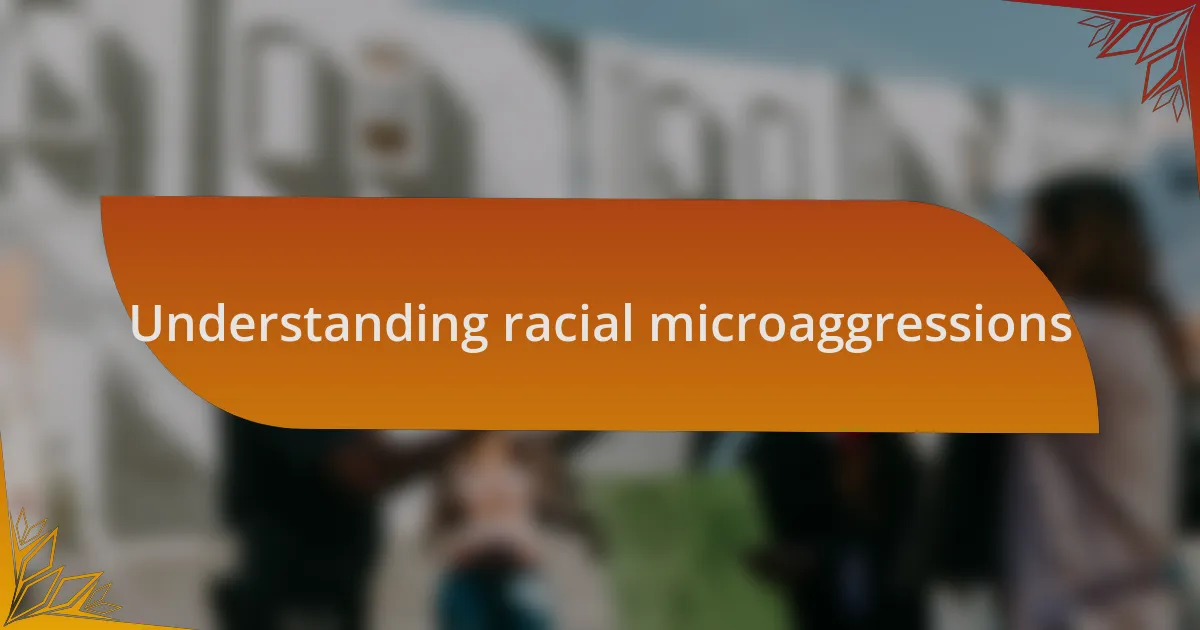
Understanding racial microaggressions
Racial microaggressions are those subtle, often unintentional, comments or actions that convey prejudiced attitudes toward marginalized groups. I remember a time when someone remarked, “You speak English really well,” as if my fluency was unexpected given my racial background. It made me question how others perceive my identity—why do people assume my abilities are tied to my race?
These incidents accumulate over time, leaving emotional scars that can be hard to articulate. Have you ever felt a pang of frustration from a seemingly innocuous remark? I often reflect on how these moments can chip away at one’s sense of belonging, making me wonder, “Am I ever truly seen for who I am beyond stereotypes?”
Understanding racial microaggressions is crucial because they reveal deeply ingrained biases within our society. I once overheard a colleague dismiss my ideas in a meeting, attributing them to my appearance rather than my expertise. It was a stark reminder of how these small acts can perpetuate systemic inequality, emphasizing the need for awareness and dialogue around this pervasive issue.
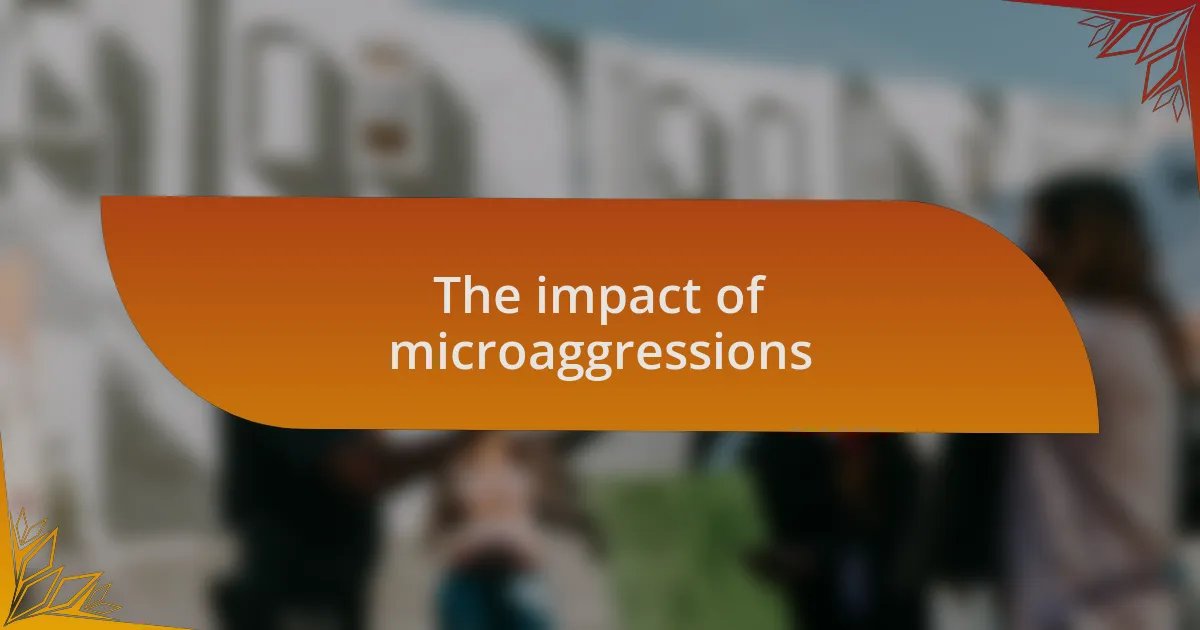
The impact of microaggressions
The impact of microaggressions extends far beyond the immediate moment; they can significantly affect an individual’s mental health. I recall a period when I felt increasingly anxious in social settings, constantly worrying about how I would be perceived. It’s unsettling to think that a few careless words can lead to long-lasting feelings of unease or self-doubt, making one question their place in various spaces.
Over time, these microaggressions can foster a sense of alienation. I found myself withdrawing from conversations and opportunities, convinced that my input would be undervalued. Do you relate to that feeling of wanting to shrink into the background when faced with dismissive remarks? It struck me that for many, this is not just about words but about feeling invisible in a society that often overlooks marginalized voices.
Moreover, the cumulative effect of experiencing microaggressions can lead to more profound implications, such as lower self-esteem and resilience. I have seen friends who once thrived in their environments gradually lose that spark in their eyes, weighed down by constant questioning of their worth. Isn’t it curious how a few micro-edits to personal narratives can rewrite a life story? Understanding this impact is essential; it propels conversations around reparations and the healing necessary for those affected.
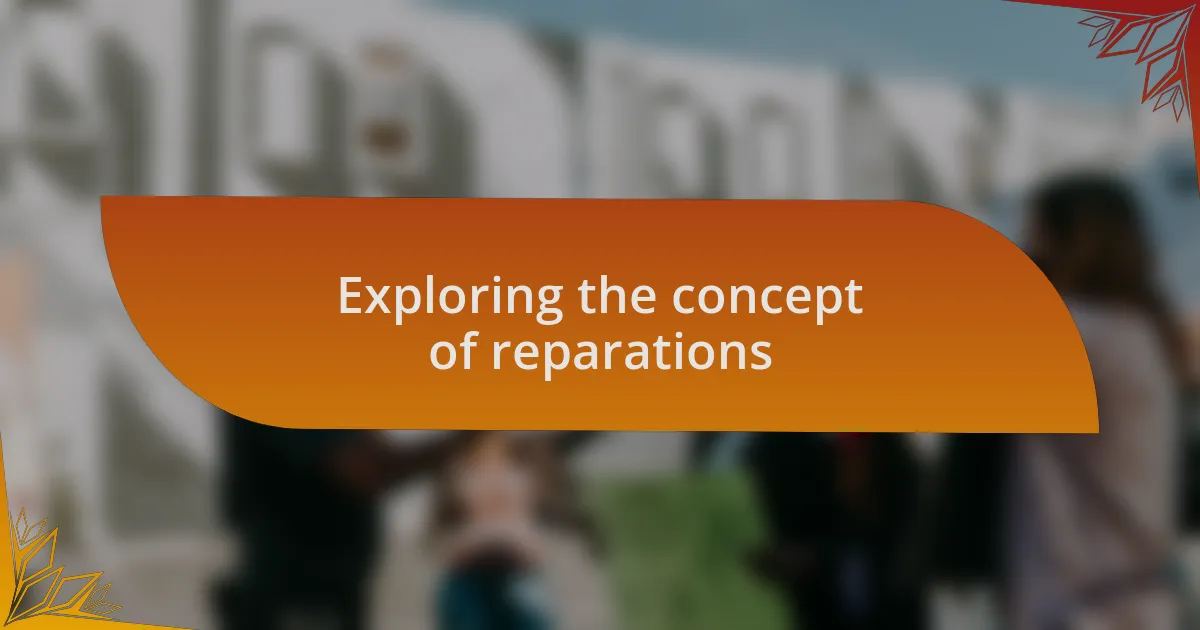
Exploring the concept of reparations
Reparations often spark intense discussions, as they aim to address the historical injustices faced by marginalized communities. When I first encountered the concept, I struggled to reconcile it with my experiences. Could a financial payment truly compensate for generations of oppression? My conversations with friends opened my eyes to the multifaceted nature of reparations, which isn’t merely about money but also recognition of the wrongs and a commitment to change.
Many argue that reparations are a pathway to healing, providing a chance for communities to rebuild and regenerate. I remember chatting with a colleague who felt that reparations could empower underprivileged communities to reclaim lost opportunities. It made me ponder how important it is not only to acknowledge the past but to actively create opportunities for the future. Isn’t it fascinating how reparations can foster a sense of belonging and validation for people whose histories have been overlooked?
In exploring reparations, it’s crucial to understand its broader implications beyond just monetary compensation. Personally, I’ve realized that reparations can initiate critical dialogues about accountability and responsibility. By addressing the root causes of racial inequality, we are taking tangible steps toward a more equitable society. Have we considered the most effective ways to implement reparations? Reflecting on this question deepens my appreciation for the need to create systemic change in our approach to justice and equity.
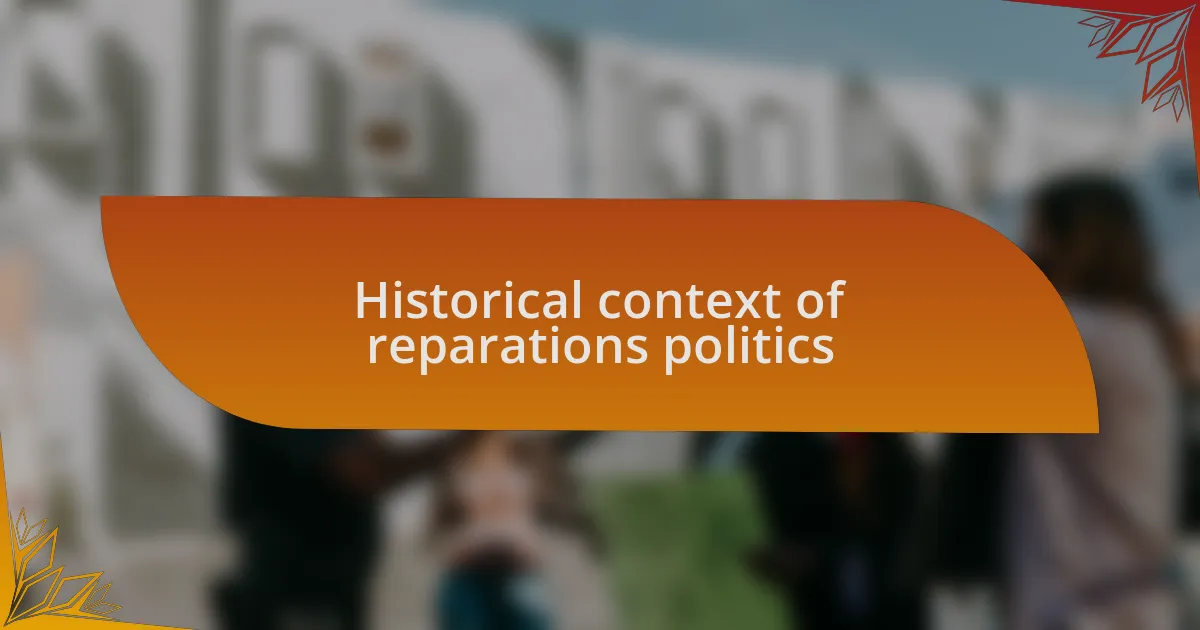
Historical context of reparations politics
The dialogue around reparations in the United States has its roots deep in the post-Civil War era, particularly with the promise of “40 acres and a mule.” This commitment to providing former enslaved people with land aimed to offer them a tangible form of restitution. Reflecting on this, I often wonder how such a promise could have changed the trajectory of African American lives had it been honored. It raises a poignant question: what would America look like today if those first steps towards reparations had materialized?
Moving forward, the struggle for reparations gained momentum through key events like the Civil Rights Movement. Activists demanded justice and rectification not just for past grievances but for enduring discrimination. I remember listening to a moving speech from a civil rights leader who connected personal stories of hardship with broader systemic issues. It made me question, how often do we allow personal narratives to drive the conversation around policy changes?
In recent years, the idea of reparations has expanded to acknowledge the lasting impacts of colonialism and systemic racism globally. This evolution illustrates just how crucial it is to connect historical injustices with present-day solutions. Personally, I’ve come to see reparations as not only a matter of compensation but rather a vital conversation about identity, heritage, and future responsibilities. What insights can we draw from history to inform our actions today? Understanding this history enriches our perspective and highlights the urgency of reparations as a means to build a more equitable society.
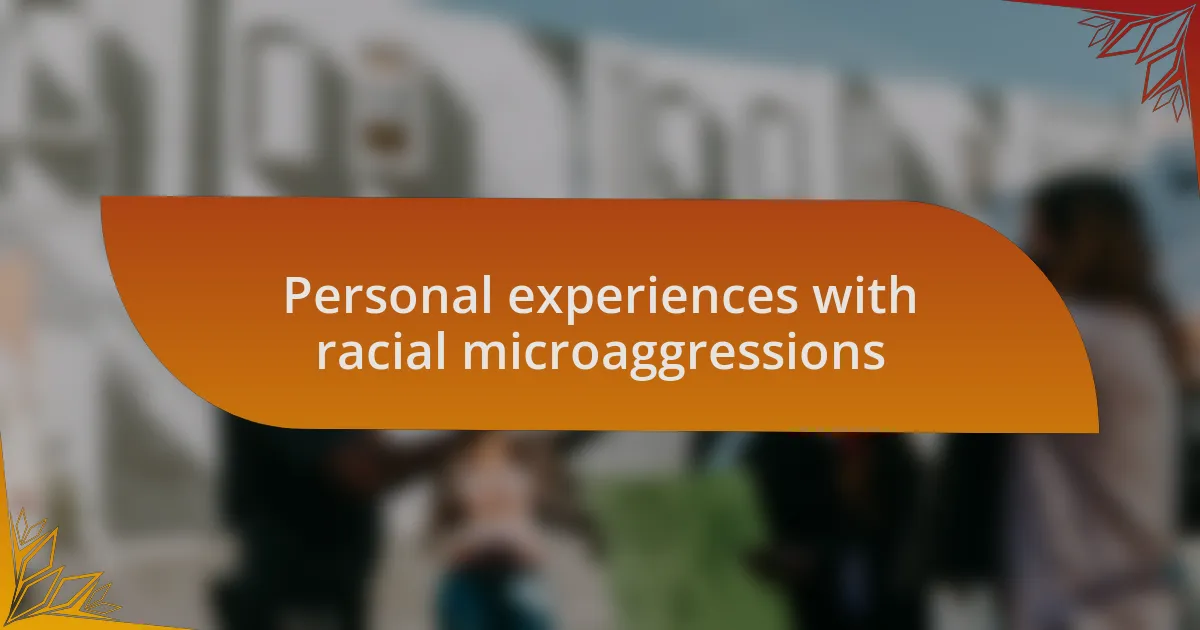
Personal experiences with racial microaggressions
On several occasions, I’ve encountered subtle comments that, at first, seemed innocuous. One time, a colleague remarked, “You speak English so well!” This seemingly harmless statement left me feeling both appreciated and simultaneously marginalized. I began to question what assumptions lay beneath the compliment and how they reflected broader societal attitudes.
I remember a vivid moment while attending a networking event where I faced a series of dismissive gestures. As I shared my experiences, the listeners’ eyes seemed to glaze over, but one person interrupted me to ask, “Where are you really from?” This question stung; it felt like an implication that my identity was not authentic—an outsider even in a room where I sought connection. Reflecting on that incident, I realized how often microaggressions can overshadow genuine dialogues.
These experiences have made me acutely aware of the power of words and their impact on self-identity. It’s perplexing how a few simple phrases can contribute to a feeling of alienation. How can we foster environments where everyone’s voice is elevated? From my perspective, acknowledging these microaggressions is a vital step towards building empathy and understanding in our discussions about race and justice.
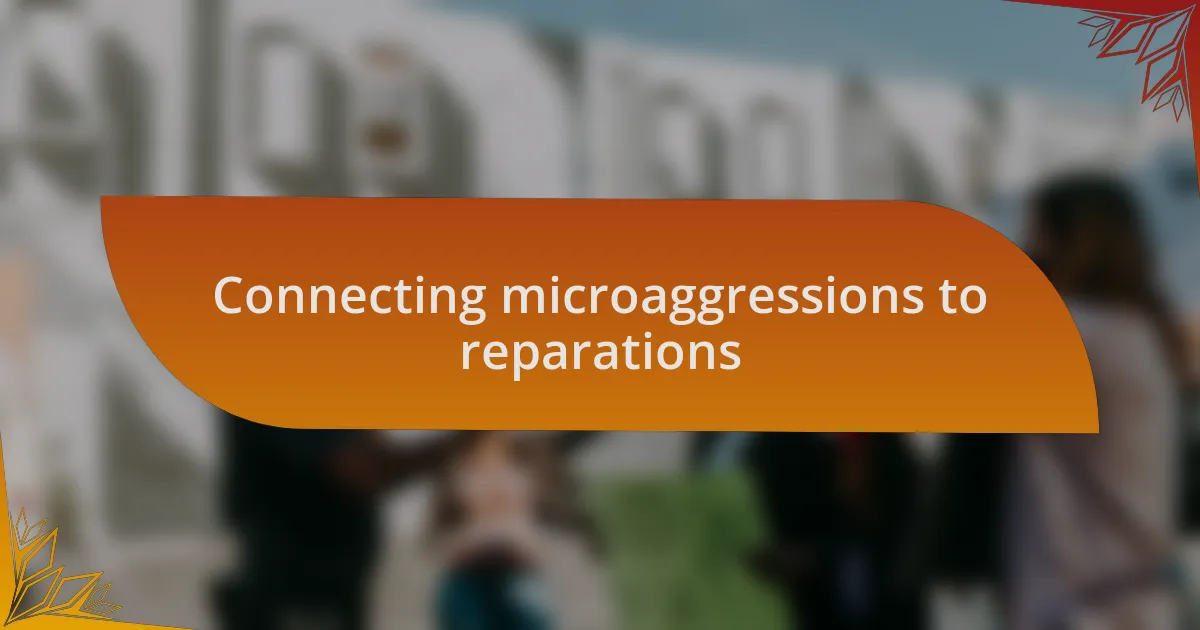
Connecting microaggressions to reparations
Microaggressions often act as a reminder of historical injustices that underpin the call for reparations. I recall a moment when I was denied a leadership role despite my qualifications, and instead of confronting the overt bias, colleagues masked their disbelief with backhanded remarks about my potential. This experience illuminated how microaggressions can serve as a modern reflection of systemic inequalities that reparations aim to address, highlighting the need for not just financial redress but also acknowledgment of the emotional labor inflicted upon marginalized communities.
In conversations surrounding reparations, it’s essential to recognize that microaggressions are not merely isolated incidents but a continuous thread of larger societal patterns. For instance, hearing comments like “You’re so articulate” can feel like a backhanded compliment, suggesting that my intelligence is a rarity for someone in my community. How can we reconcile the impact of these daily slights with the broader narrative of reparative justice? This connection emphasizes that reparations are about more than restitution; they’re about redefining the societal narrative surrounding race and identity.
When we connect microaggressions to reparations, we unveil a deeper layer of injustice that demands addressing. Each microaggression can be seen as a piece of the puzzle that highlights systemic oppression—puzzle pieces that show just how interconnected our societal dynamics are. Sharing these experiences prompts us to ask, what does true reconciliation look like? It must involve both acknowledgment of past grievances and a commitment to fostering an inclusive future that dismantles the very biases these microaggressions embody.
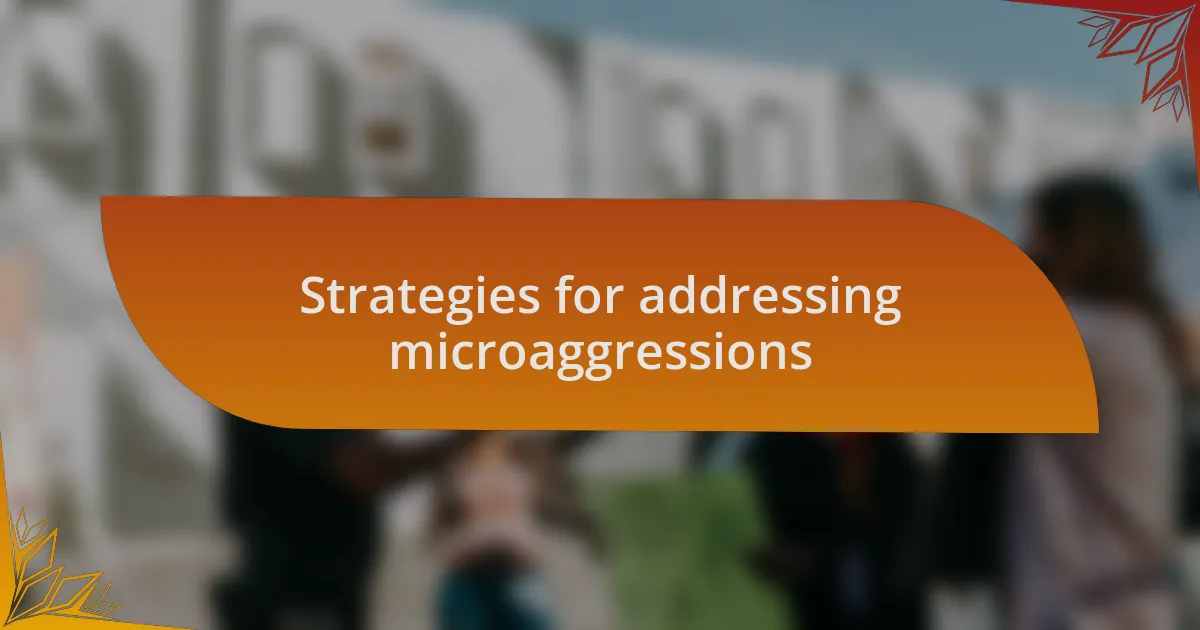
Strategies for addressing microaggressions
Addressing microaggressions requires a proactive approach, both personally and collectively. When I experienced yet another dismissive comment about my cultural background, I chose to respond calmly. Instead of letting my frustration fester, I opened a dialogue with the individual, sharing how their words affected me. This not only educated them but also created a space for more honest conversations about race and identity.
Creating a supportive environment is essential for addressing these subtle yet damaging slights. I remember organizing a workshop at my workplace that focused on racial sensitivity. The experience showcased how beneficial it is to provide a platform where colleagues can safely discuss their insights and experiences. By encouraging vulnerability, we dismantle the barriers that allow microaggressions to thrive.
Lastly, I have found that developing a personal toolkit to navigate these situations can be empowering. This might include practicing responses or grounding techniques for when microaggressions occur. For instance, when I hear someone say, “You’ve figured out how to fit in so well,” I take a moment to breathe and then clarify my identity with pride. What if we all built our own strategies to better respond to these moments? It’s all about turning discomfort into understanding and action.